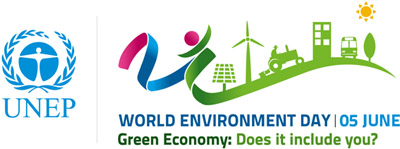- Written by sherlley
- Hits: 3810
World Environment Day 05 June 2012
World Environment Day (WED) is celebrated every year on 5th June to raise global awareness of the need to take positive environmental action. It is run by the United Nations Environment Programme (UNEP).
It was the day that United Nations Conference on the Human Environment began. The United Nations Conference on the Human Environment was from 5–16 June 1972. It was established by the United Nations General Assembly in 1972. The first World Environment Day was on 1973. World Environment Day is hosted every year by a different city with a different theme and is commemorated with an international exposition in the week of 5 June.
The Theme
Green Economy: Does it include YOU?
The 2012 theme for World Environment Day is Green Economy: Does it include you? Evidently, there are two parts to this theme and the first tackles the subject of the Green Economy. This is where some people shut off their minds because they find the concept of the Green Economy a little too complex to understand.
On the contrary, the Green Economy is really something that is applicable all around you and it is easy to imagine how you fit in it.
What is the Green Economy?
The global financial crisis that began in 2007, and is still resonant today, is considered by many economists as the worst financial crisis since the Great Depression of the 1930s. One of the key lessons we can draw from this experience is that running economies the way we’ve always done, doing business as usual, is clearly not an option. The new Green Economy is therefore a proposal for an alternative and far more sustainable way of doing business.
A green economy is described as one that results in improved human well-being and social equity, while significantly reducing environmental risks and ecological scarcities. In other words, we can think of a green economy as an economic environment that achieves low carbon emissions, resource efficiency and at the same time is socially inclusive.
The Green Economy Initiative
The UNEP-led Green Economy Initiative, launched in late 2008, provides a comprehensive and practical working mechanism, through analysis and policy support for investing in green sectors and in greening environmental unfriendly sectors.
The Green Economy Initiative has three main activities, which are to produce a Green Economy Report and related research materials, which will analyse the macroeconomic, sustainability, and poverty reduction implications of green investment in a range of sectors; to provide advisory services on ways to move towards a green economy in specific countries; and to engage a wide range of research, non-governmental organizations, business and UN partners in implementing the Green Economy Initiative.
By the way, please check the front page of The Hindu dated 5 June 2012. It is amazing. So what are you going to do to make this world green?



.jpg)







